#odysseus of ithaca
Text
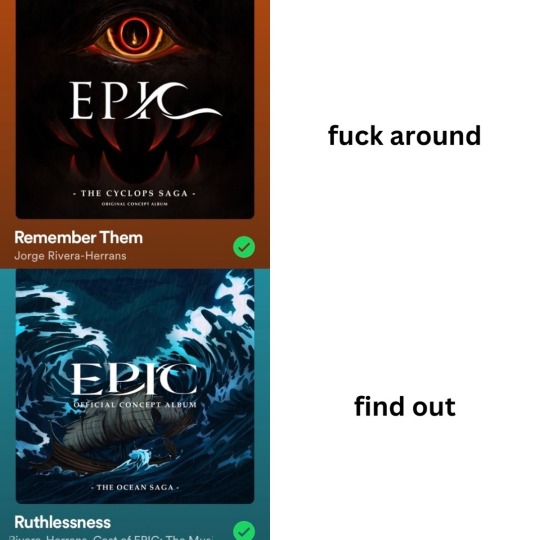
Odysseus in Epic: the musical
#Odysseus#the Iliad#homer#Greek mythology#epic the musical#epic: the ocean saga#epic: the cyclops saga#but seriously#Poseidon#jorge rivera herrans#that’s it that’s the show#odysseus of ithaca
5K notes
·
View notes
Text
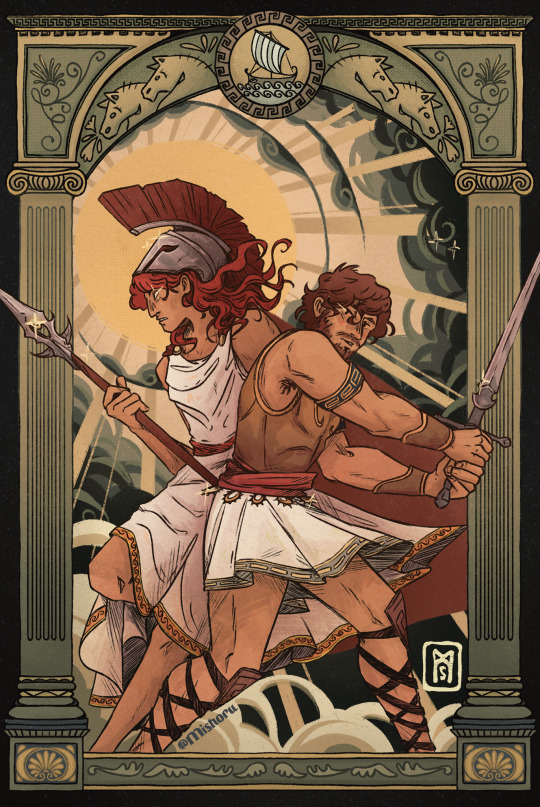
Warriors of the mind
#illustration#art#procreate#epic the musical#epic troy saga#odysseus#odysseus of ithaca#the odyssey#athena#greek mythology#musical#musical fanart#epic the musical fanart
3K notes
·
View notes
Text

when does a man become a monsterrrr
#sorry sorry sorry sory#im so excited for the underworld saga#im gonna go insane#epic the musical#odysseus#odysseus of ithaca#digital art
1K notes
·
View notes
Text

So that's basically what happened in "The Cyclops Saga" right ?
#I finally listened to everything that has already been officially released by “Epic: The Musical”#my art#Odyssey#Athena#meme redraw#meme#fuck you mean nuh uh#odysseus#athena#epic fanart#odysseus fanart#athena fanart#odysseus of ithaca#Odysseus#epic: the musical#Epic the musical#The Cyclops Saga#polyphemus#Greek mythology#epic the cyclops saga
2K notes
·
View notes
Text
okay so I was doing a Research™️ about ancient Greek etymology as one does and I found some Things that made me want to Violently Claw My Arms Off please allow me to force feed you my discoveries
So there are 2 words for "not" in ancient Greek, depending on the context: ou and mē. Having introduced himself in the Cyclops episode as " ou tis", or No-man, he then stabs Polyphemus in the eye. When Polyphemus' brothers come to check on him, they say this:
"... surely no man [mē tis] is carrying off your sheep? Surely no man [mē tis] is trying to kill you either by fraud or by force?"
Right after this, after the other cyclopes ditch Polyphemus, Odysseus's inner monologue goes something like this:
"Then they went away, and I laughed inwardly at the success of my clever strategem [metis]." (pronounced mEH-Tis)
Now, there's a difference between mē tis and metis. [mē tis] (pronounced mEH-Tis with a space between the syllables) is the literal translation for "no man". Metis is a word for extreme intelligence/cunning, which is something Odysseus is famous for.
Now, there are several examples of abuse of metis/intelligence in the Odyssey, but I think the juxtaposition between [mē tis], or the concept of anonymity, and metis, or extreme intelligence, is REALLY interesting. Odysseus's adoption of the title "No-man" was characteristic of metis--it was a really smart move that simultaneously hid him from the cyclops and avoided any future consequences. It was a highly effective strategy all wrapped up in a nest little package with a bow on it.
But when he revealed himself as Odysseus of Ithaca, effectively throwing off No-man (anonymity and [mē tis]), that was characterized as idiocy--he's essentially doxxed himself, and now he's doing to (spoiler alert) get tossed around the Mediterranean by Poseidon for the next 10 years.
This is really interesting because it lets you see the parallels/codependency between metis(intelligence) and humility. When Odysseus refused to allow himself to go unnoticed (hubris) he suffered for it. BUT when he declined instant glory/satisfaction (kleos) in order to achieve the long term goal of survival, he was rewarded with Athena's favor (pay attention. This part is important).
And this situation repeats itself MULTIPLE TIMES in the Odyssey--the EXACT SAME THING happens near the end of the book, with the suitors. When. Odysseus is dressed as a beggar and the suitors/Antinious are abusing him, he ACTIVELY CHOOSES not to react--he doesn't stand up and rip off his disguise and start hollering "TIS I, ODYSSEUS OF ITHACA! FEAR MY WRATH"
No. He sits there patiently and waits. He plans and schemes and quietly orchestrates their downfall without alerting them of it. Why? Because he learned his lesson the first time this happened. He buried his rage and adopted what was, according to Grace LA Franz, a more feminine form of metis, weaving a web of destruction for his enemies that ultimately resulted in their total annihilation (see Weaving a Way to Nostos: Odysseus and Feminine Metis in the Odyssey by Grace LaFranz). His patience allowed him to win the whole prize--no questions asked, no 10-year-long-business-trip strings attached--just the sweetness of a full victory. And he is, once again, rewarded with Athena's favor--both in the battle with the suitors and in the aftermath (cleanup/reuniting with Penelope).
This really reinforces the idea in the Odyssey that Odysseus's defining characteristic is not just his intelligence--it's his ability to learn from his mistakes. He used what he learned at the Lotus Eaters Island against Polyphemus--the Lotus Eaters drugged his men, so he drugged Polyphemus. He used what he learned from Circe and Polyphemus against the suitors--Circe used false sweetness and honeyed words to lure his men into a trap, so that's exactly what he did to the suitors. His hubris on Polyphemus' island cost his whole crew their lives, so he intentionally left well enough alone until the right time. He didn't just learn from his failures--he turned them into BATTLE STRATEGY.
i don't care what anyone says that is completely totally and objectively awesome
#Odysseus is a certified baddie 112% of the time#he's literally the coolest you can't convince me otherwise#there's a reason that literally everyone has a crush on him#even the lesbians#its the wordplay. his words#read me a poem in iambic pentameter you bloody stinky man#literally everyone: his sad wet vibes and dark undereye circles have captivated me entirely#odysseus#the odyssey#tagamemnon#odysseus x penelope#telemachus#epic the musical#the cyclops saga#odysseus of ithaca#poseidon#etymology#ancient greece#ancient history
2K notes
·
View notes
Text
My name is Odysseus of Ithaca, you killed my men, prepare to be blind
419 notes
·
View notes
Text
hi yes if ruereguard are the patrochilles parallel then percabeth are the Odysseus and Penelope parallel BUT (and I cannot stress this enough) annabeth is Odysseus
here's why:
Odysseus is a character who is the epitome of hubris. he's the smartest person in every room he walks into, he was the main strategist for the entire Greek army, everyone was looking to him for guidance and approval. he's Athena's champion (and pet liar) but eventually loses favour with her because pride comes before the fall. the overarching story of the odyssey is that he's trying to go home to his wife and will do whatever it takes with his cunning and wits to get there over the course of 10 years.
sounds awfully familiar to Annabeth Chase, favoured daughter of Athena, general and main strategist of CHB, smartest person in the room, prideful, strong and the person everyone looks to for approval. Athena holds annabeth in high regards but will put her aside the moment she "embarrasses her". and not only did Annabeth spend months trying to get Percy back, but its approx. 10 years from her arrival at CHB and the end of HoO, in which her overarching goal is to create something permanent - and she achieves that, though changed in unimaginable ways.
Percy and Penelope may be a bit of a stretch until you look at the main thing the two of them have in common - their unending and unconditional loyalty. Penelope sat and weaved day in and day out for maybe 20 years as men ate her out of house and home, because she would not abandon her husband and the hope that he would return home. by all accounts, it could have been easier for her to simply accept whatever offer suited her most as queen of Ithaca but she didn't. and we know that loyalty is our boy Percy's fatal flaw, and that one of the only things he could remember was annabeth.
#rosi shitposts#thanks for coming to my ted talk#percy jackson#percabeth#annabeth chase#pjo series#the odyssey#odysseus#odysseus of ithaca#penelope of ithaca#odysseus and penelope#percy and annabeth#epic the musical#im not an odysseus defender#i still think hes a cheater and a loser#but the thematic parallels are there babey#pjo
186 notes
·
View notes
Text
whatever level of insanity odysseus was under when he spat "you don't think I know my own palace? I built it" I'm down
#like#dark odysseus best odysseus#king of ithaca#jorge rivera herrans#epic the musical#epic the musical king#odysseus of ithaca#odysseus#that's such a banger line to spit at the nonbelievers of your power to absolutely wreck their shit up#odysseus moonlights as a carpenter /j#odysseus's mind is not only politics and warfare savvy but architect savvy too#i hope you all get what i mean#i mean odysseus being a man of architecture means he understands the foundation/base of a strong building#ergo he knows how to setup and pay it off#sorry but i love me a schemer#i'm an incredibly cerebral person so this is very attractive to me
382 notes
·
View notes
Text

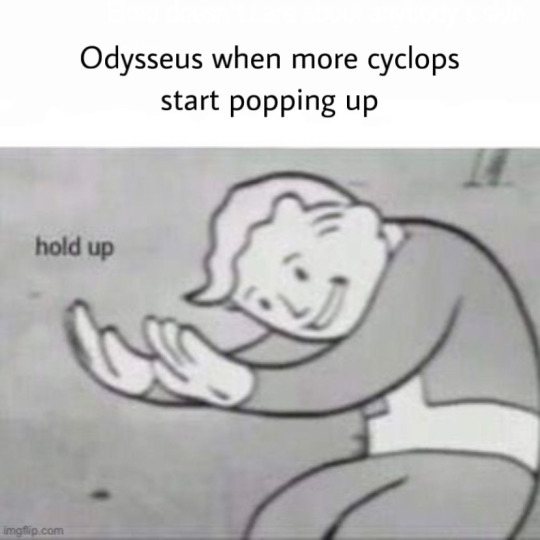


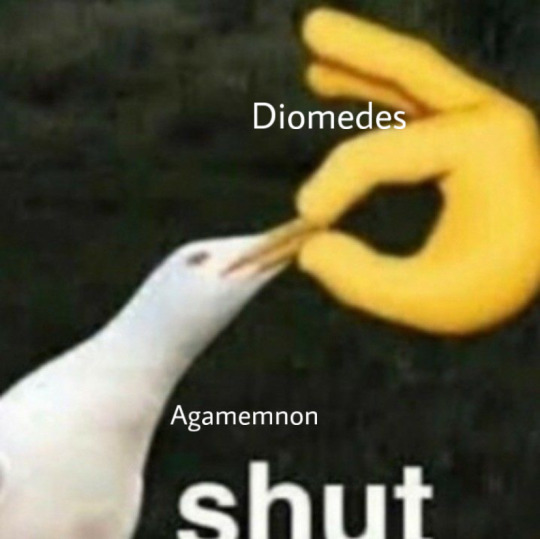

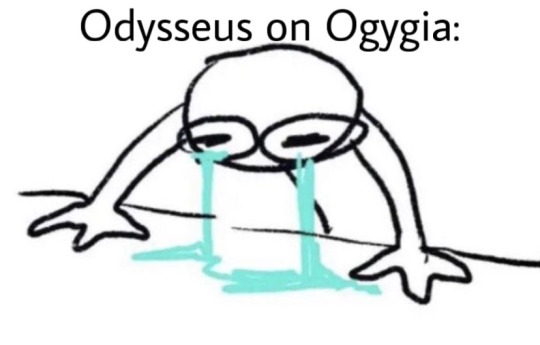


THE MEMES ALWAYS COME BACK
#epic the ocean saga#greek mythology#epic: the ocean saga#epic the cyclops saga#epic: the musical#epic the musical#epic: the cyclops saga#polyphemus#odysseus#odysseus of ithaca#aphrodite#achilles#tsoa achilles#tsoa#agamemnon#diomedes#hermes#the song of achilles#song of achilles#memes#Greek mythology memes#mythology memes#ancient greek
348 notes
·
View notes
Text
Odysseus: 🎶...But brother I can assure you, our journey is almost done.🎵
Everyone else: "That's what you said the last 29 times we got attacked by something!!!!"
152 notes
·
View notes
Text
So, I LOVE Epic: This Musical and I'm excited for some of the songs in the Circe Saga, but one of TWO songs that I absolutely DESPISE in this musical is coming out and I'm so stressed out about it.
"There Are Other Ways" and "I'm Not Sorry For Loving You" make me so frustrated because it looks like they fall into downplaying the coercion and abuse Odysseus went through because the abusers are women. AND I HATE THAT.
"There Are Other Ways" is a song between a person who has power to force a person into doing what they want (Circe) and their victim (Odysseus), who can only comply. And from what I've read it has the line "There's no puppet here."
It's really clever writing because if you know the story, you know Odysseus is in a precarious situation and he was told by Hermes that when she asked to sleep with him, he needed to do it. Here's three different translations of the moment Hermes tells him "Don't you tell her no" with the warning from Hermes bolded:
"'And I will tell thee all the baneful wiles of Circe. She will mix thee a potion, and cast drugs into the food; but even so she shall not be able to bewitch thee, for the potent herb that I shall give thee will not suffer it. And I will tell thee all. When Circe shall smite thee with her long wand, then do thou draw thy sharp sword from beside thy thigh, and rush upon Circe, as though thou wouldst slay her. And she will be seized with fear, and will bid thee lie with her. Then do not thou thereafter refuse the couch of the goddess, that she may set free thy comrades, and give entertainment to thee. But bid her swear a great oath by the blessed gods, that she will not plot against thee any fresh mischief to thy hurt, lest when she has thee stripped she may render thee a weakling and unmanned.’
“ ‘And I will tell you of all the wicked witchcraft that Circe will try to practice upon you. She will mix a potion for you to drink, and she will drug the meal with which she makes it, but she will not be able to charm you, for the virtue of the herb that I shall give you will prevent her spells from working. I will tell you all about it. When Circe strikes you with her wand, draw your sword and spring upon her as though you were going to kill her. She will then be frightened, and will desire you to go to bed with her; on this you must not directly refuse her, for you want her to set your companions free, and to take good care also of yourself, but you must make her swear solemnly by all the blessed gods that she will plot no further mischief against you, or else when she has got you naked she will unman you and make you fit for nothing.’
"I will tell you all Circe’s fatal wiles. She will mix a drink for you, blending drugs with the food, but even so she will fail to enchant you: the powerful herb I will give you will prevent it. Let me tell you the rest. When Circe strikes you with her length of wand, draw your sharp sword and rush at her, as if you intend to kill her. She will be seized with fear. Then she’ll invite you to her bed, and don’t refuse the goddess’ favours, if you want her to free your men, and care for you too. But make her swear a solemn oath by the blessed gods that she won’t try to harm you with her mischief, lest when you are naked she robs you of courage and manhood.”’
He had no choice in the matter. It was a "you will have to sacrifice yourself OR you will never get your men back and you won't be safe if you don't do it" moment. While Circe's not telling this directly to Odysseus, it's still COERCION because he knows if he says "No, I want to be faithful to my wife" Circe will harm him. But a lot of people don't know that and are going to continue to perpetuate the idea that Odysseus cheated on his wife. 😒 And they're going to use that line of "There's no puppets here" as "proof" that Odysseus cheated.

If you can sympathize with Ovid's later adaptation of Medusa as a victim of Poseidon, but refuse to acknowledge Odysseus was as much a victim of Circe AND Calypso and claim he's cheating... Please, ask yourself: why is that?
#epic: the musical#epic: the circe saga#odysseus was a victim#i will die on this hill#odysseus loves his wife#odysseus chose penelope over helen of troy#all the man wants is to go home to his wife and son#odysseus#odysseusxpenelope#epic circe saga#odysseus of ithaca#coercion#circe#circe saga#epic the musical#jorge rivera herrans#tw coercion#tw sa
160 notes
·
View notes
Text

my emotional support couple
#the odyssey#homer’s odyssey#tagamemnon#odypen#penelope of ithaca#odysseus#odysseus of ithaca#the epic cycle#orchestrated art
111 notes
·
View notes
Text
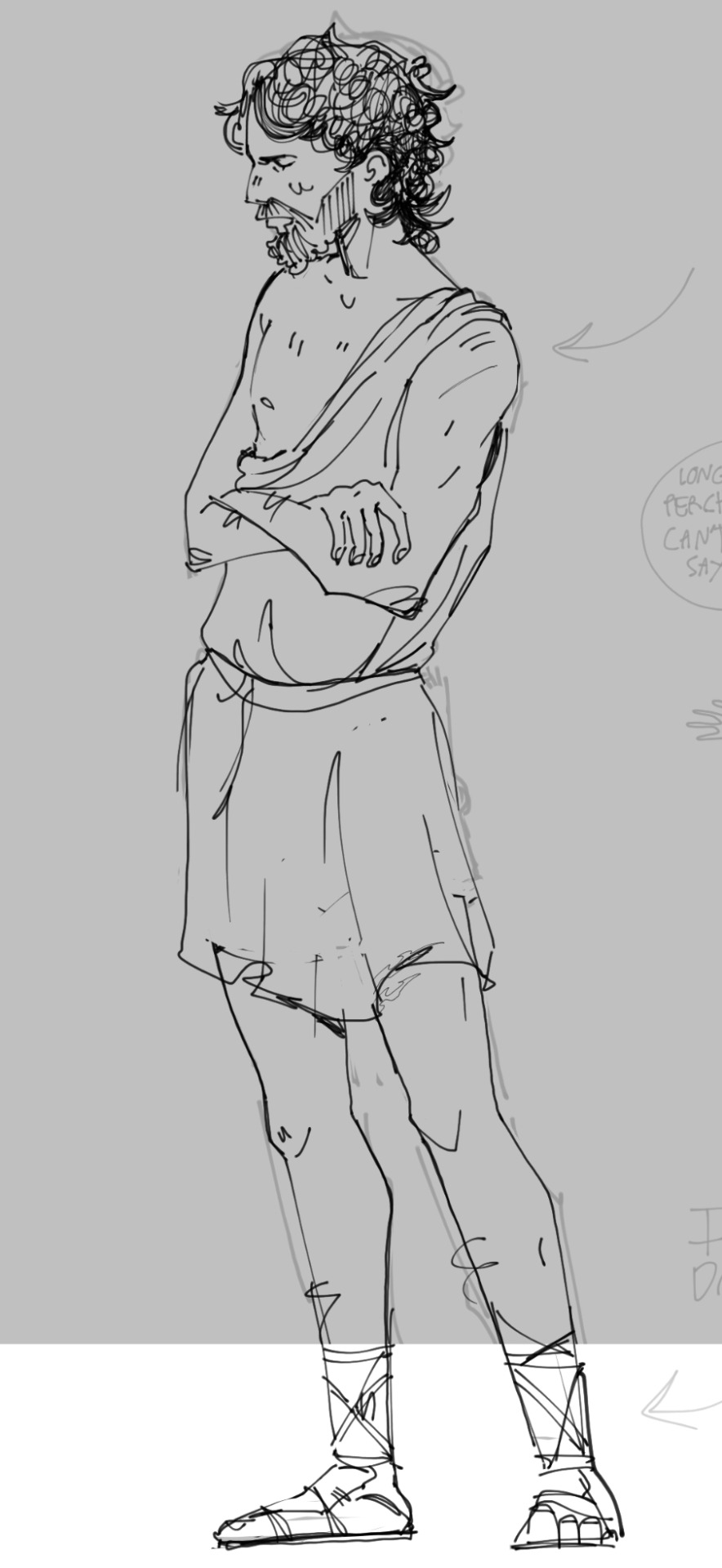
ok fixed it
326 notes
·
View notes
Text


Matching profile pics for you and your partner 🫶
#greek mythology#tagamemnon#odysseus#penelope odyssey#penelope of ithaca#odysseus of ithaca#the odyssey
80 notes
·
View notes
Text
Honestly I need someone to start selling me shit the way Hermes sells Odysseus in Wouldn’t You Like. Presenting a whole bop on why I should do this dishes. A taste of the power, you say?
#epic the musical#odysseus#the odyssey#epic the circe saga#circe saga#odysseus of ithaca#I’m a weak woman#but give to me a funky toon and I’ll Get Down
64 notes
·
View notes
Text
Odysseus: How do I do this?
Athena: Yeah, I can't tell you how to do it, you just have to know
Odysseus: ... Yeah, but unfortunately I don't know?
#incorrect epic quotes#incorrect epic the musical quotes#epic the musical#epic odysseus#epic Athena#odysseus of ithaca#source: Clarkson's Farm#epic the troy saga#epic the cyclops saga#epic the ocean saga#epic the circe saga
96 notes
·
View notes